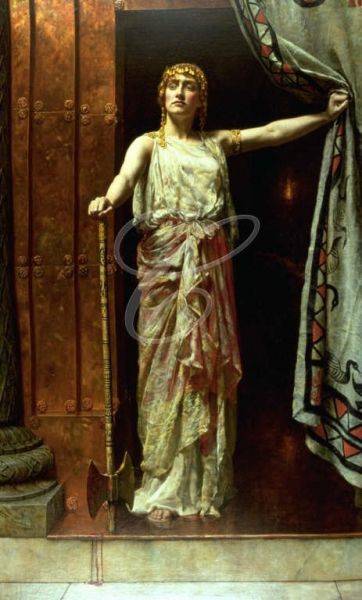Mafia Justice: Puzo and Aeschylus
In recent years there have been countless books, films, documentaries, etc. produced about the ‘horrors’ of the Mafia. “Excellent Cadavers”; “Midnight in Sicily”; “Letizai Battagia Photographs of Sicily”; most recently, “Another Corleone: Another Sicily” are just a few that come to mind. Virtually all these productions are from the point of view of moral agents (good and just people) who have suffered at the hands of, and struggle against, amoral agents (bad and unjust people). The world, in these works, is Manichaean: “the struggle between a good, spiritual world of light [idealism], and an evil, material world of darkness [power & greed].” There is no moral ambiguity from this point of view. Good is unequivocal, obvious, intuitive; so too Evil. The Mafia is evil – “plain and simple”. In the absence of moral ambiguity: right and wrong, just and unjust are not subject to discussion or debate – only indignation. And, how could anyone possibly think otherwise reading and viewing the heart felt scenarios of pain and suffering of ostensively innocent (good) people at the hands of undoubtedly malicious (evil) Mafiosi.
However, there was a time in primordial Sicily when the moral world was not thought to be Manichaean; good and evil were not so obvious and intuitive, reality was morally ambiguous. That was the time when Sicily was known as Magna Graecia. Then suffering as a result of injustices was not, in the minds of philosophers and tragedians, a cause of indignation; rather, a call for contemplation – a quest for understanding. For example, Greek-Sicilians by the thousands would flock to the theaters in Segesta, Taormina and Siracusa to see Tragic plays such as Aeschylus’ “Agamemnon” wherein the protagonist Clytemnestra soliloquized:
“So in the twofold issue of the strife
Mingle the victor’s shout, the captives’ moan.
For all whom the sword has spared
Cling weeping – some unto a brother slain,
Some childlike to a nursing father’s form,
And wail the loved and lost the while their neck
…‘neath the captive’s chain.”
“Strife, moaning, weeping and wailing” was the stuff of great poetry and drama in those times. There was no thought to overcome or transcend them. Rather, through “catharsis”, to come to a greater understanding, and learning to live and deal with their eternal presence.
Similarly, Plato went to Sicily, as describe in the “Seventh Letter”, to advise leaders on the meaning and nature of ‘justice”, which was not thought to be intuitive and obvious. Rather, it brought forth great speculative philosophy. Plato’s dialogues like the “Gorgias” and “Republic” view ‘justice’ through a multifaceted prism – an ever metamorphic transforming reality. Also, Thucydides’ narrative about the Sicilian front of the Peloponnesian War is laced with philosophic discourse about the nature of justice. In short, “man’s inhumanity to man” in ancient Sicily was the stuff of great literature and philosophy.
Today, there seems to be few remnants of those ancient philosophic roots in the commentary on Sicilian culture. The “bedda martri” wail of a Sicilian widow or mother suffering from the unjust killing of an innocent husband or son does not conjure in us perplexity and wonder. Neither does it call forth the poet or philosopher’s muse. Questions about why or how such terrors come to be does not provoke contemplation, art or philosophy. There is no moral perplexity in a Manichaean world. Quite simply, unjust and innocent suffering happens because evil men in pursuit of material wealth and power victimize good men who struggle for an ideal. End of conversation! There’s no more to be said; only remorse and indignation are warranted.
Mario Puzo was an exception. He carried a recessive philosophic gene of our ancestors and it manifested itself in the “Godfather” novel and movies. He saw the complexity of morality and ambiguity in the milieu of Mafia cultural.
Italian film director Paolo Sorrentino criticized Francis Coppola for having “mythologized organized crime”. Yes! That is precisely the point - just as Greek tragedy is based on mythology. Mythology is the genera of perennial and eternal issues; the incomprehensible issues that keep beckoning us to comprehend. Tragedy dramatizes and puts mythology into a human context. Tragedy is not sociology! Sorrentino is a sociologist. Puzo and Coppola are tragedians. To my mind, the philosophers, tragedians and their audiences in ancient Sicily would have reveled in the opening scene of the “Godfather".
Amerigo Bonasera asked to meet with Mafioso Don Corleone to make a request. Two young men
had assaulted his daughter; “they beat her like an animal.” She was a “beautiful and trusting girl.” Now she will never be beautiful or trust people again. She is physically and psychologically scared for life. She reported the crime to the police. The men were arrested, tried and convicted. Then they were given a suspended sentence; essentially no punishment for the physical and psychological suffering inflicted on this innocent child.
In the spirit of Aeschylus, Plato and Thucydides, Puzo raises the question ‘what is justice?’ The whole of the novel and movie trilogy struggles with that question. The answer is not obvious or intuitive or ever resolved. Puzo like his ancient literary progenitors does not see the world as a Manichaean dichotomy wherein the diametric poles of good and evil are obvious; the choice between them easily made.
Bonasera, in his words, “went to the police like a good American…I wanted to be a good American…[Yet] I stood in the courtroom like a fool and these bastards smiled at me as they walked free without punishment. And, I said to my wife: We must go to Don Corleone for justice.” The Mafioso replies:
“[For years you avoided me] you thought you did not need me. After all, the police guarded you, there were courts of law, you and yours could come to no harm. Now you come to me and say: ‘Don Corleone give me justice.’” Again, Bonasera says: “ Yes, I ask you [Mafioso Corleone] for justice.” In short, he went to the Mafia for the justice that the American court, the State system of justice, had denied him.
To appreciate Puzo’s ancient moral mindset in this scene, compare it to one in “Agamemnon”. Note the similarity between Bonasera’s and Clytemnestra’s experience and response in the following:
Clytemnestra’s husband Agamemnon sacrificed their daughter Iphigenia to the god Artemis to obtain a favorable wind to take the Greek fleet to Troy. When he returned from Troy Clytemnestra brutally kills him.
Clytemnestra appears, standing over the corpses of her husband. She declares that she has killed him to avenge Iphigenia:
“This is the sum and issue of old strife, [i.e. the pain of her daughter’s death]
Of me deep –pondered and at length fulfilled. …
[planned – not act of spontaneous passion]
I trapped him.
Then somte him… and at each wound
He cried aloud…[with] each dying breath
Flung from his breast… [a] rain of blood
[Falling] upon me; and I was fain to feel
That dew-not sweeter is the rain of heaven…
I bid you to rejoice, … [rejoice: this vicious killing is cause for celebration?]
Justly-ay, more than justly-on his corpse [justice is done?]
When the Chorus chants lamentations, Clytemnestra responds:
“O ye just men, who speak my sentence now …
Ye had not voice of old to launch such doom
On him, my husband , when he held as light’
My daughter’s life as that of sheep or goat…
[judges had nothing to say when her child was slain]
That deed of his [was ignored]…
By ye, who then were dumb, [now] are stern to judge [me]…
My guilt thou harpest, o’er and o’er [judges harp on her guilt but not Agamemnon]
Chorus
“Thou guiltless of this murder, thou!
Who dares such thought avow”
[Clytemnestra does not think she committed a crime; rather an act of justice]
Clytemnestra responds
“By the sword his sin he wrought,
And by the sword himself is brought
Among the dead to dwell”
In sum, both Bonasera and Clytemnestra had innocent daughters brutalized for no just reason. Both found the State system of justice oblivious to the crimes - the judge in Bonasera’s case and the “just men” in Clytemnestra’s. Both had to go outside the State for ‘justice’ – Mafia justice, if you will.
Moving from literature to real life biography, Peter Mass in his biography of New York Mafioso Sammy ‘The Bull’ Gravano relates a similar story of State vs. Mafia justice. When Sammy was 13 years old, he was working in the office of his father’s dress manufacturing shop. Two Irish men came in demanding ‘pay-offs’ from his father or else harm would come to him. After they left, Sammy was emotional. His father seemed completely unfazed. He told Sammy not to worry he would talk to Zuvito. When the men came back the next day, they were completely different. “Why didn’t you tell us Zuvito is you “compare’? We’re sorry. We apologize. Don’t forget, please tell Zuvito we were here, and that we apologized.”
Zuvito was a Mafioso. Sammy’s father did not feel that he could get protection from the State’s police. Like Bonasera and Clytemnestra he did not feel that the State was willing or capable of dealing with the injustice that would have been done to him and his family. Justice could only prevail outside of the State’s system.
In all three of these scenarios (Clytemnestra , Bonasera and Garvano ) the role of the State in defining and administering justice is called into question. The great tragedian Sophocles, in his tragedy “Ajax”, specifically addresses ‘State Justice’. Menelaus’ says:
“Never can the laws have prosperous course in a [State] where dread hath no place; nor can [it] be ruled discreetly … if it lacks the guarding force of fear and reverence…where there is license to insult and act at will, doubt not that such a State…sinks into the depths.”
The Irishmen who came into the Garvano office had no “dread, fear or reverence” for the laws the State. They were free to “act with license, insult and at will.”
The boys who assaulted Bonasera’s daughter had no “dread, fear or reverence” for the laws of the State. They were free to “act with license, insult and at will.”
Agamemnon had no “dread, fear or reverence” for the laws of the State. He was free to “act with license, insult and at will.”
It was only when the “dread, fear and reverence” of the Mafia was brought to bear that justice prevailed for Mr. Garvano. And, the role of “dread, fear and reverence” in the administration of justice is a theme of the “Godfather” and “Agamemnon”.
Today, the Camorra in Naples, the Ndrangheta in Calabria and the Mafia in Sicily, have no “dread, fear or reverence” for the laws the State. They are free to “act with license, insult and at will.” Manichaeans describe and explain these criminal phenomena as the forces of darkness and evil prevailing over goodness and light. Philosophers and tragedians wonder about the role of the State in this ramped criminality. For example, 150 years after the Risorgimento, does Rome still govern as though “Italy ends at the Garigliano”? Just a thought!



































i-Italy
Facebook
Google+
This work may not be reproduced, in whole or in part, without prior written permission.
Questo lavoro non può essere riprodotto, in tutto o in parte, senza permesso scritto.